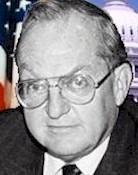Hearing of Courts and Intellectual Prop. Subcomm.
Re: DOJ failure to enforce the NET Act; and HR 1761.
Date: May 12, 1999.
Source: This document was created by Tech Law Journal by transcribing an audio recording.

| Opening Statement of Rep. Howard Coble (R-NC). Hearing of Courts and Intellectual Prop. Subcomm. Re: DOJ failure to enforce the NET Act; and HR 1761. Date: May 12, 1999. Source: This document was created by Tech Law Journal by transcribing an audio recording. |
 |
|
Good afternoon. The Subcommittee will come to order. Today, we are here to discuss the implementation of the NET Act and enforcement against Internet piracy.
During the first session of the 105th Congress, HR 2265, the "No Electronic Theft Act" (NET Act) was enacted into law. HR 2265 reversed the practical consequences of the case United States v. LaMacchia which held that electronic piracy of copyrighted works may not be prosecuted under the federal wire fraud statute; and that criminal sanctions available under titles 17 and 18 of the U.S. Code for copyright infringement do not apply in instances in which a defendant does not realize a "commercial advantage or private financial gain." HR 2265 criminalized computer theft of copyrighted works, whether or not the defendant derives a direct financial benefit from the acts of misappropriation.
Since the enactment of the NET Act in December 1997, there have been no prosecutions brought by the Department of Justice under the Act. This is very troubling to some, and very frankly, to me. According to U.S. intellectual property based industries, there is no shortage of potential prosecutions that could be pursued under the Act, it is believed by many.
Also, currently, the U.S. Sentencing Commission does not have any Sentencing Commissioners and is therefore unable to promulgate sentencing guidelines for the Act. And a report issued by the Commission staff failed to address the NET Act's explicit instructions to consider that deterrence be adequately addressed in the sentencing guidelines. These facts have made enforcement of the NET Act virtually impossible, if not impossible. This is important because in order to be successful in the battle against Internet piracy, not only must Congress enact legislation giving legal recourse to copyright owners, but those laws must be implemented by the appropriate law enforcement agencies.
In line with accomplishing the goal of deterrence, today we will also be discussing the need to increase the statutory damages available to copyright owners whose registered works have been infringed. Copyright piracy is flourishing in the world. With the advanced technologies available and the fact that many computer users are either ignorant of the copyright laws or simply believe that they will not be caught or punished, the piracy trend likely will continue. One way to combat this problem is to increase the statutory penalties for copyright infringement so that they will be an effective deterrent to this conduct.
It is vital that the United States recognizes the intellectual property rights and provides strong protection and enforcement against violations of those rights. By doing so, the United States will protect its valuable intellectual property, and encourage other countries to enact and enforce strong copyright protection laws.
Let me determine what the status is on the House floor. Would somebody --- I think that there is probably one vote, and that is to be followed by another vote. If that is in fact the case, I am going to depart and return imminently. You all rest easy in the mean time.
Editor's Note: The House was voting on amendments to HR 775, a Year 2000 litigation reform bill. Rep. Coble recessed the subcommittee meeting to go to vote. After the recess, Representatives Coble, Goodlatte, Pease, and Rogan returned, and the subcommittee hearing continued.